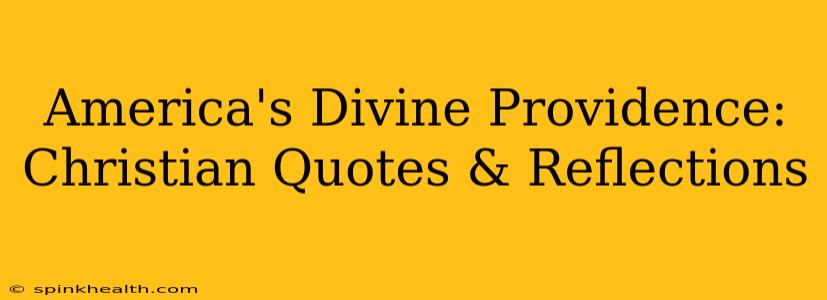America's history is interwoven with the belief in divine providence, a concept deeply rooted in Christian faith. This belief, that God's hand guides the affairs of nations, has profoundly shaped the nation's identity, inspiring both hope and controversy. Exploring this complex relationship requires examining historical context, influential figures, and enduring theological questions. This post delves into the Christian perspective on America's destiny, incorporating relevant quotes and reflections to illuminate this fascinating and multifaceted topic.
What Role Did Religion Play in the Founding of America?
The role of religion, particularly Christianity, in America's founding is a subject of ongoing debate. While the Founding Fathers were not uniformly religious in the modern sense, many held deeply held Christian beliefs that influenced their political thought and actions. Many sought to establish a nation founded on principles they believed reflected God's will, seeking to create a society governed by moral laws derived from their religious understanding. The very concept of natural rights, central to the Declaration of Independence, was often grounded in theological arguments about human dignity and inherent worth created in God's image. However, it's crucial to acknowledge the diversity of religious beliefs present at the time, and the limitations of equating the entire nation's founding with a singular, unified Christian perspective.
How Have Christian Beliefs Shaped American Political Thought?
Christian beliefs have profoundly shaped American political thought, influencing various aspects of the nation's development. The concept of "city upon a hill," drawn from the Sermon on the Mount, became a powerful metaphor for America's role as a beacon of liberty and righteousness in the world. This ideal, while inspiring, has also been subjected to criticism, as it can be used to justify both exceptionalism and interventionism. The emphasis on individual liberty and responsibility, often linked to the concept of free will within Christian theology, has shaped the country's political landscape, influencing debates about personal freedoms and governmental authority. Moreover, the social justice movements throughout American history have frequently drawn inspiration from Christian teachings emphasizing compassion, equality, and the dignity of all people.
What are some key Christian quotes about America's destiny?
Numerous quotes reflect the Christian perspective on America's role in the world. While it's essential to understand the historical context and potential biases within such statements, they offer a glimpse into the prevailing beliefs of the time:
- John Winthrop's "City upon a Hill" sermon: This sermon, delivered in 1630, urged the Puritan settlers to create a model society that would be an example to the world, a concept that has had a lasting impact on American identity.
- Ronald Reagan's invocation of the "shining city upon a hill": Reagan’s use of this phrase resonated with many Americans, reiterating the enduring power of this image.
It is crucial to note that these powerful metaphors have been interpreted and reinterpreted throughout history, sometimes leading to different, and sometimes conflicting, conclusions about America's purpose and role in global affairs.
Did the Founding Fathers Believe in Divine Providence?
Many of the Founding Fathers held a belief in divine providence, believing that God played a role in guiding the nation's destiny. This belief is evident in their writings and speeches, where they often invoked God's guidance and blessing. However, their understanding of providence varied. Some saw it as a direct intervention in historical events, while others understood it more subtly as God establishing natural laws that governed human affairs. The extent of their faith and its influence on their political decisions remains a complex topic of historical inquiry.
What are some examples of divine providence in American history?
Defining specific examples of divine providence in American history is inevitably subjective. However, many believers point to instances of apparent miraculous survival or unexpected success during times of crisis as evidence of God's intervention. The American Revolution's successful outcome against a seemingly insurmountable British force is often cited, as are periods of national unity following major conflicts or tragedies. Interpretations of these events vary widely, reflecting the complex relationship between faith, history, and national identity.
What is the Christian perspective on the future of America?
The Christian perspective on America's future is diverse, reflecting the broad spectrum of beliefs within Christianity. Some believe America is still fulfilling its divinely appointed role as a beacon of freedom and righteousness, while others express concerns about the nation's moral trajectory. Many Christians advocate for social justice and seek to align national policy with their faith's teachings on compassion and equality. Ultimately, the Christian perspective on America's future is not a monolithic viewpoint but a tapestry of varied beliefs, hopes, and concerns, reflecting the dynamic nature of both faith and the nation itself.
This exploration of America's Divine Providence offers a starting point for understanding the intricate relationship between faith and the nation's history. It is important to approach this topic with nuance, acknowledging the complexities of historical interpretation and the diversity of religious viewpoints. Further research and thoughtful reflection are essential to fully appreciate this enduring aspect of American identity.

